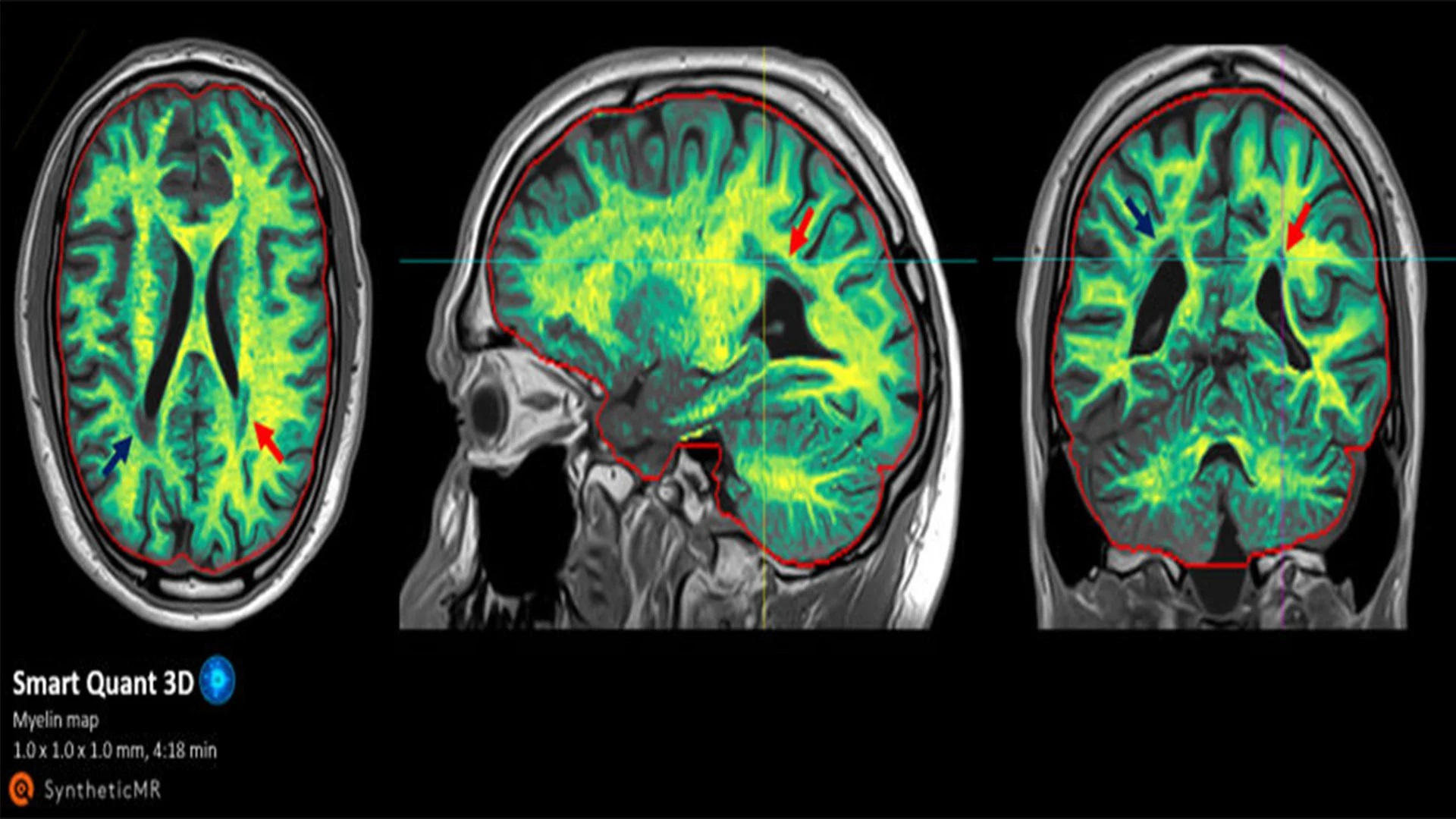
In a groundbreaking collaboration, Philips and Synthetic MR have unveiled Smart Quant Neuro 3D at #ECR2024. This pioneering technology harnesses AI to revolutionize brain imaging, providing accurate quantification of tissue volume and distribution. Smart Quant Neuro 3D empowers clinicians with objective decision support for diagnosing brain disorders like MS, TBI, and dementia. By automatically measuring brain tissues, including myelin, it enhances diagnostic confidence and treatment strategies. Leveraging Philips’ SmartSpeed reconstruction technology and Synthetic MR’s SyMRI NEURO 3D software, this innovation optimizes workflow efficiency, accelerating patient scanning and post-processing. The partnership between Philips and Synthetic MR heralds a new era in neurology care, promising improved outcomes for patients worldwide.
Philips and Synthetic MR have joined forces to unveil Smart Quant Neuro 3D, a revolutionary advancement in neurology imaging, at #ECR2024. This collaboration marks a significant milestone in objective decision support for diagnosing and assessing therapy in brain disorders. Smart Quant Neuro 3D leverages AI to provide accurate 3D segmentation and volume measurement of critical brain tissues, enhancing diagnostic confidence for conditions like MS, TBI, and dementia. By quantifying myelin loss and other abnormalities, it facilitates early intervention and treatment monitoring. With Philips’ SmartSpeed reconstruction technology and Synthetic MR’s SyMRI NEURO 3D software, this innovation promises streamlined workflow efficiency, benefiting clinicians and patients alike.
Accurate quantification of different brain tissue types’ volume and distribution constitutes a cornerstone in diagnosing brain diseases. However, conventional visual assessments of MRI images often fall prey to subjectivity, lacking the requisite precision. Meanwhile, measuring tissue volume from 2D image slices proves virtually impractical. Smart Quant Neuro 3D surmounts these challenges by leveraging AI to deliver fully validated automatic and precise 3D segmentation and volume measurement of crucial brain tissues, including white matter, gray matter, cerebrospinal fluid, and myelin. These measurements, when interpreted by trained physicians, furnish invaluable insights for diagnosing patients.
Ruud Zwerink, Business Leader of MR at Philips, underscored the transformative impact of Smart Quant Neuro 3D, particularly in navigating the complexities of diagnosing life-altering brain injuries and neurodegenerative diseases. By furnishing clinicians with an accessible tool to furnish quantitative data for tracking treatment efficacy, Smart Quant Neuro 3D facilitates informed decision-making, thereby enhancing patient care by enabling proactive management of neurological conditions and optimizing therapeutic outcomes.
Dr. Julien Savatovsky, Neuroradiologist and Head of the Radiology Department at the Hospital Foundation Adolphe De Rothschild in Paris, France, extolled Smart Quant’s capacity for expediting exams and exploring quantitative metrics, which holds immense potential in stratifying patients with analogous imaging characteristics on conventional MR sequences. Furthermore, its integration into clinical workflows streamlines the generation of multiple synthetic weighted images from a single sequence, thereby enhancing diagnostic precision.
Smart Quant Neuro 3D emerges as a game-changer in measuring myelin, the protective sheath enveloping nerves that facilitate efficient electrical impulses transmission in the brain. Notably, myelin loss constitutes a hallmark of TBI. By unveiling abnormalities that elude detection on conventional MR scans, Smart Quant Neuro 3D facilitates early diagnosis and intervention in TBI cases. The technology’s ability to quantitatively measure myelin empowers clinicians to delineate the extent and repercussions of TBI, distinguishing it from other neurological disorders.
Moreover, the capability to quantify myelin loss or damage assumes paramount significance in progressive brain ailments such as multiple sclerosis. Quantitative assessment of myelin loss equips clinicians with tools to gauge the condition’s trajectory over time and evaluate the efficacy of cutting-edge disease-modifying drugs. Importantly, Smart Quant Neuro 3D’s provision of comprehensive clinical MR imaging contrasts from a single acquisition obviates the need for patient recall, thereby optimizing efficiency and expediting diagnosis.
Smart Quant Neuro 3D not only enhances diagnostic precision but also augments workflow efficiency for clinicians. Leveraging Philips’ AI-based MR SmartSpeed reconstruction technology, which accelerates imaging speed by nearly threefold while delivering up to 65% greater resolution, the technology facilitates swift patient scanning, thereby catalyzing throughput in radiology departments. Subsequently, SyntheticMR’s SyMRI NEURO 3D software performs zero-click automatic analysis of imaging data, furnishing accurate tissue segmentation and volume measurement in under ten seconds of post-processing.
As #ECR2024 witnesses the unveiling of Smart Quant Neuro 3D, a collaborative effort between Philips and Synthetic MR, the landscape of neurology care undergoes a transformative shift. This groundbreaking technology, driven by AI, empowers clinicians with unparalleled diagnostic precision and treatment insights for brain disorders. By automatically measuring tissue volume and distribution, including crucial myelin levels, Smart Quant Neuro 3D enhances diagnostic confidence and treatment efficacy. Leveraging Philips’ SmartSpeed reconstruction technology and Synthetic MR’s SyMRI NEURO 3D software, this innovation optimizes workflow efficiency, paving the way for enhanced patient care. The partnership between Philips and Synthetic MR signifies a commitment to advancing neurology imaging, promising improved outcomes and better lives for patients worldwide.




